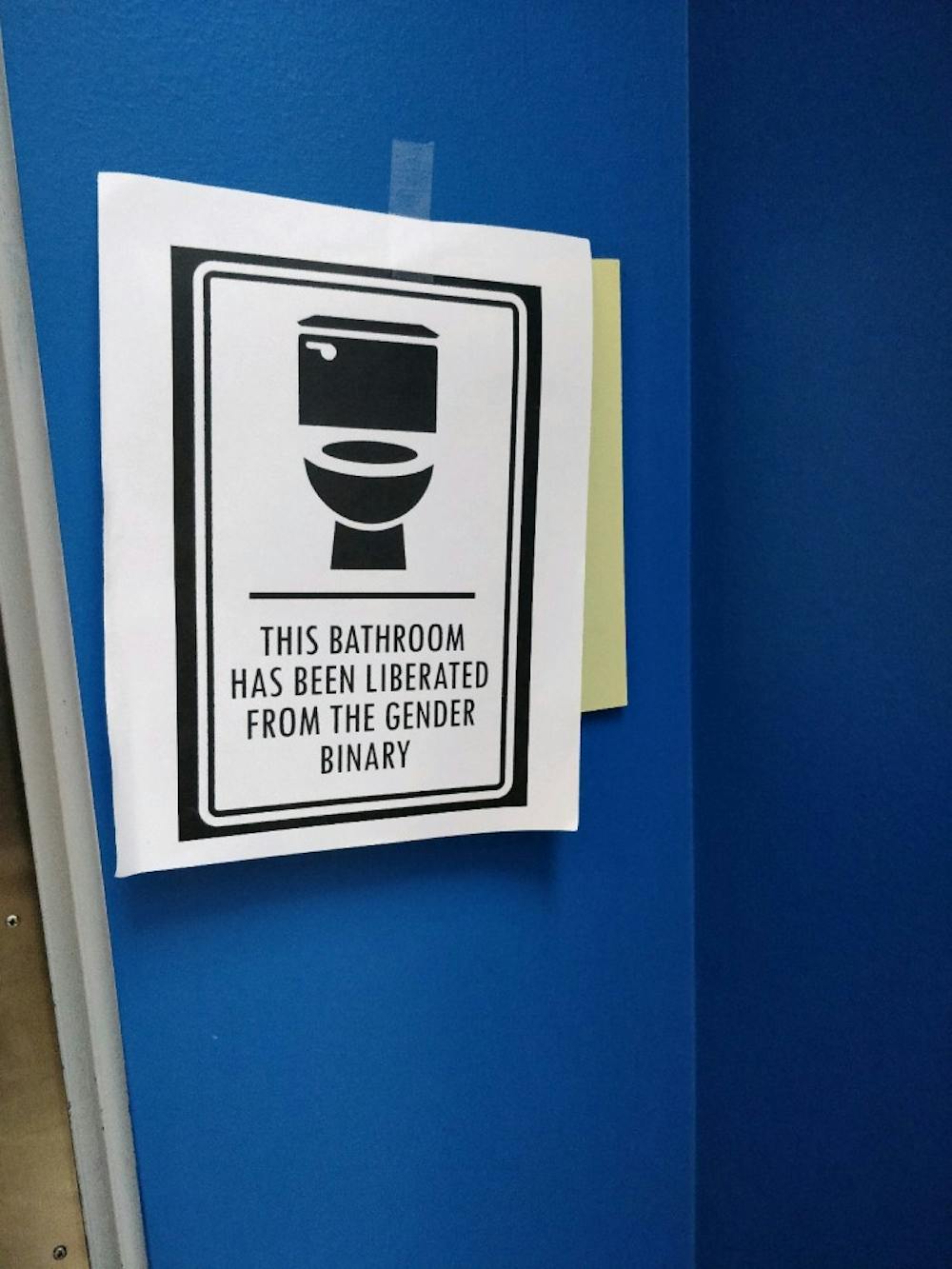On Monday, Feb. 18, posters covering male and female bathroom signs appeared outside campus bathrooms in East Pyne Hall, Fine Hall, Lewis Library, Joline Hall, and Blair Hall, among others. Each poster read, “This bathroom has been liberated from the gender binary.”
University spokesperson Ben Chang wrote in an email to the ‘Prince’ that the University does “not know the origin of the posters.”
On Monday morning, Blair residential college adviser (RCA) Stephen Chen ’19 first noticed the posters when he went to take a shower.
“My initial reaction was, ‘This seems to be a prank,’” he said, remarking that it seemed like a significant change, given that he had received no notice.
Chen checked with the other RCAs in Blair but said none had heard anything regarding the bathrooms from Mathey Director of Student Life Darleny Cepin. Chen later sent a message to his advisee (“zee”) group chat, stating that the posters had no relation to the administration and that students could take them down.
According to both Chen and screenshots shared by one of the students in the zee group chat, some of Chen’s zees openly opposed the posters.
Later in the day, Chen met with Cepin, who confirmed that the posters were not endorsed by the administration or related to any new policy, according to Chen.
“[She] warned us that there can be some consequences for people accepting these policies [expressed by the posters] before it’s [sic] official,” Chen said. “There are implications for RCDB (Residential College Disciplinary Board) … things where it can lead to misconduct.”
Chen noted that Title IX issues could arise if, for example, “a male [were] using the women’s restroom assuming it was gender neutral.”
Chen, however, was concerned about the lack of information regarding the rules that students could get in trouble for not following.
“As far as official policy goes, there’s not exactly one website that states, ‘This is [sic] the rules,’” Chen said. “I would say that’s definitely a shortcoming.”
Cepin stated in an email to The Daily Princetonian that she had no additional information about the posters.

“I can confirm that Princeton defines Gender Inclusive Bathrooms (also called Gender Neutral), as single occupancy, lockable bathrooms,” Cepin wrote in the email. “All other bathrooms have an assigned gender. Members of our community are encouraged to use the bathroom that aligns with their gender identity and where they feel most comfortable.”
Princeton Progressive digital editor Katherine Stiefel ’20, who saw the signs in residential colleges and in other buildings across campus, expressed support for the posters, calling them “an important acknowledgement of the symbolism that [the University] refuses to change on its bathroom signage.”
“[The posters’] message in general is asking students to confront ideas that they’ve internalized about gender and particularly the binary construction of gender and sex in our society,” Stiefel said.
Stiefel was one of two signatories on an op-ed published in the ‘Prog’ on Tuesday, Feb. 19, about the gender-neutral posters.
An anonymous post on Tiger Confessions noted the appearance of a poster on the women’s bathroom sign in Fine Hall but not the men’s right next to it, asking, “Is it just me, or is this sort of problematic and sexist? Why do men get their own bathroom, but not women?”
Alec Leng ’21, who also saw the posters in Fine Hall, deferred to his reply on the Tiger Confessions post, in which he reported seeing the posters taken down and then replaced.
“I’m also pretty sure that there were at least two rounds of signs, because apparently they were up in the morning,” Leng wrote. “They weren’t there when I first got to Fine, and then they were there again.”
Joline Hall resident Amna Amin ’21 also noted seeing a poster before it disappeared.
“I kind of liked the message of it, so I was surprised it was taken down so fast,” Amin said. “I assumed it was someone from admin or a janitor.”
Amin confirmed the same observation that the anonymous Tiger Confessions poster made: the sign was “only on the women’s bathroom and not the guy’s [sic] bathroom.”
Stiefel pointed out that the posters were originally put up on both male and female bathrooms. Many of those on female bathrooms were likely torn down rather than purposely omitted, they explained.
“They were equally distributed, [and] I know they were on both gendered bathrooms when they were being put up, but some were torn down more often than others,” they said.








